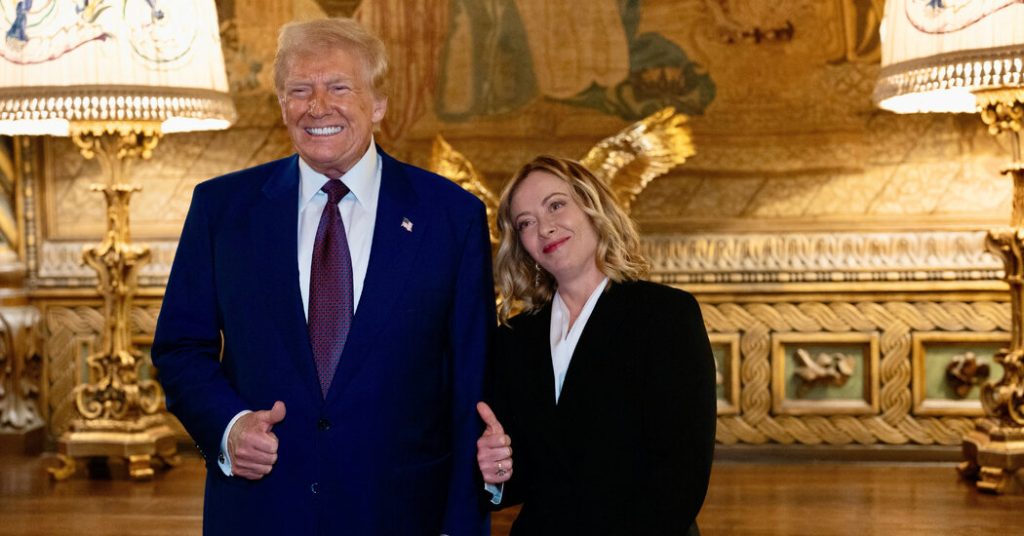Prime Minister Giorgia Meloni of Italy embarked on a significant diplomatic trip to Mar-a-Lago, the Florida estate of President-elect Donald J. Trump, for an informal meeting on Saturday. This visit, taking place just days before President Biden’s scheduled official visit to Italy and the Vatican, underscores the evolving transatlantic dynamics and Ms. Meloni’s strategic positioning within the global political landscape. The meeting, attended by potential Trump administration figures like Marco Rubio and Scott Bessent, symbolized a burgeoning alliance between two prominent conservative leaders and fueled speculation about Italy’s potential role as a key bridge between the United States and Europe under a Trump presidency.
The meeting between Ms. Meloni and Mr. Trump, both of whom have expressed mutual admiration in the past, represents a significant development in international relations. It marks one of the first visits by a foreign leader to Mar-a-Lago since Mr. Trump’s election victory, signaling Ms. Meloni’s eagerness to cultivate a strong relationship with the incoming administration. The presence of potential cabinet members further emphasizes the importance of the meeting and suggests a desire to lay the groundwork for future collaborations on various policy fronts. The screening of the film “The Eastman Dilemma: Lawfare or Justice” following their discussion adds another layer of intrigue to the meeting, suggesting a shared interest in legal and political themes.
Ms. Meloni’s proactive pursuit of this meeting underscores her ambition to elevate Italy’s international profile and leverage the potential Trump presidency to advance her political agenda. Her supporters view this budding alliance as an opportunity for Italy to become a pivotal player in mediating potential transatlantic disputes. Given Mr. Trump’s past rhetoric on trade and security alliances, Ms. Meloni’s ability to navigate these complex relationships could prove crucial for maintaining stability within the Western alliance. This meeting serves as an early indicator of her commitment to engaging directly with the incoming administration and shaping the future direction of US-European relations.
The agenda for the meeting remained largely undisclosed, but several key issues likely dominated the discussions. The ongoing war in Ukraine and the associated implications for NATO and European security undoubtedly figured prominently, given Mr. Trump’s previously expressed skepticism about continued American support. Another potential topic is trade relations, considering Mr. Trump’s past threats of imposing tariffs on European goods. The detention of Italian journalist Cecilia Sala in Iran, occurring shortly after Italy’s arrest of an Iranian suspected of supplying drone components to the Revolutionary Guards, adds another layer of complexity to the discussions. This situation exemplifies the delicate balance between international law enforcement cooperation and the potential for diplomatic repercussions.
Ms. Meloni’s strong relationship with Elon Musk, another prominent figure who has interacted with Mr. Trump, further strengthens her international standing and provides an additional avenue for communication and influence. This network of relationships highlights her strategic approach to cultivating alliances with influential figures across various sectors. While the meeting’s full implications remain to be seen, it marks a pivotal moment in the evolving relationship between the United States and Italy, particularly within the context of a rapidly changing global order.
The visit by Ms. Meloni follows similar meetings Mr. Trump has held with other right-wing leaders, including Prime Minister Viktor Orban of Hungary and President Javier Milei of Argentina. These meetings suggest a pattern of engagement with like-minded figures who share Mr. Trump’s ideological leanings. The inclusion of Canadian Prime Minister Justin Trudeau, after a trade dispute, highlights the strategic importance of maintaining communication even with those with whom Mr. Trump has had previous disagreements. This series of meetings provides insights into the potential shape of Mr. Trump’s foreign policy priorities and the types of alliances he might prioritize in a second term.


